Menu
- AyurVAID Shop
Psoriasis, known as “Kitibha Kushtha” in Ayurveda, is a chronic autoimmune skin disease caused by rapid skin cell turnover that forms red, inflamed patches or silvery scales. These patches appear mainly on the scalp, knees, elbows, lower back, and other locations on the body.
According to Ayurveda, the main cause of psoriasis is the disturbance of Vata and Kapha in the body. In some cases, Pitta imbalance is seen to cause inflammation and accumulation of toxins in Rasa and Rakta Dhatus. This condition takes place when impaired Agni causes the accumulation of Ama, thus triggering inflammatory responses and the immune system’s attack on healthy cells. Ayurveda views this as a complex interplay of physiological, environmental, and lifestyle factors that compromise the body’s natural healing intelligence. Psoriasis can evolve into psoriatic arthritis, causing significant joint inflammation and potential long-term mobility challenges. It may affect any skin area, but mostly affects regions with extensor surfaces, such as the scalp, nails.
Conventional management usually means symptomatic management using various steroids, immunosuppressants, and biologicals, which have a potential side effect profile and do not target the root cause of the disease. The disease progression calls for comprehensive management. Apollo AyurVAID adopts an integrated, individual, and protocol-driven approach (Precision Ayurveda), addressing psoriasis’s root causes rather than treating only its symptoms.
Our in-depth health assessment exposes the fundamental root cause of the condition. Based on the assessment, a specially trained team of Ayurveda physicians will design an individualized protocol to reduce dependence on long-term drugs, prevent disease progression, strengthen immunity for life, and provide tailored therapies based on the individual’s needs.
Ayurveda offers the most promising comprehensive skin psoriasis treatment for this aggressive autoimmune condition. Psoriasis treatment in Ayurveda minimizes or prevents the use of pharmacological drugs for a long period and helps prevent the disease from progressing.
Ayurveda works towards root cause reversal in psoriasis patients, but sometimes may cater only to symptom management, such as the following:
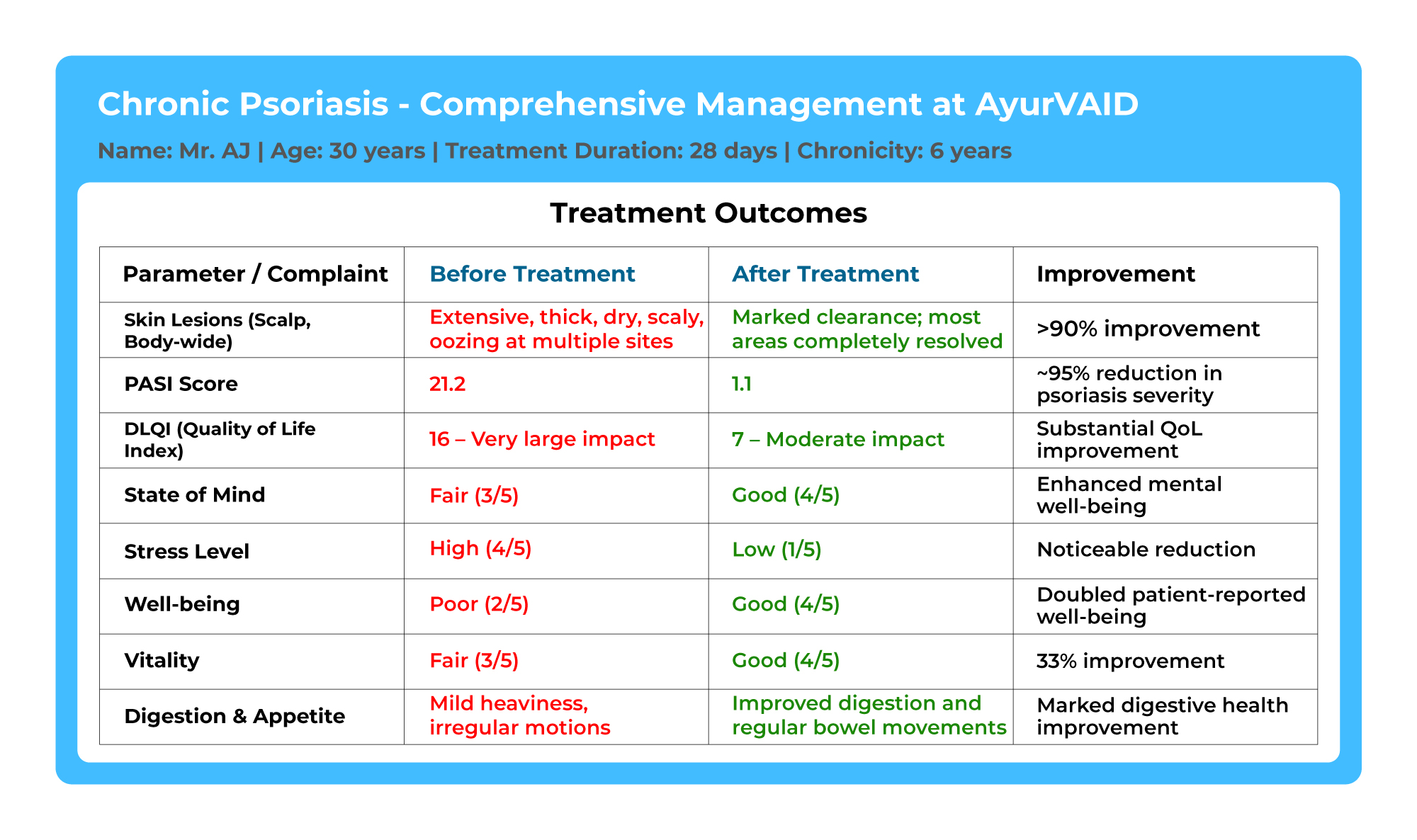
Psoriasis can co-exist with comorbidities like cardiovascular disease, metabolic syndrome, and psychological disorders. Conventional treatment options include immunosuppressants, biologicals, topical treatments, phototherapy, systemic preparations, and lifestyle and dietary changes. However, prolonged use can cause skin thinning and rebound effects, while systemic agents can cause organ toxicity. These interventions focus on symptoms rather than etiology. Ayurveda has a significant role in the comprehensive management of psoriasis. Psoriasis treatment in Ayurveda will yield the following unique benefits:
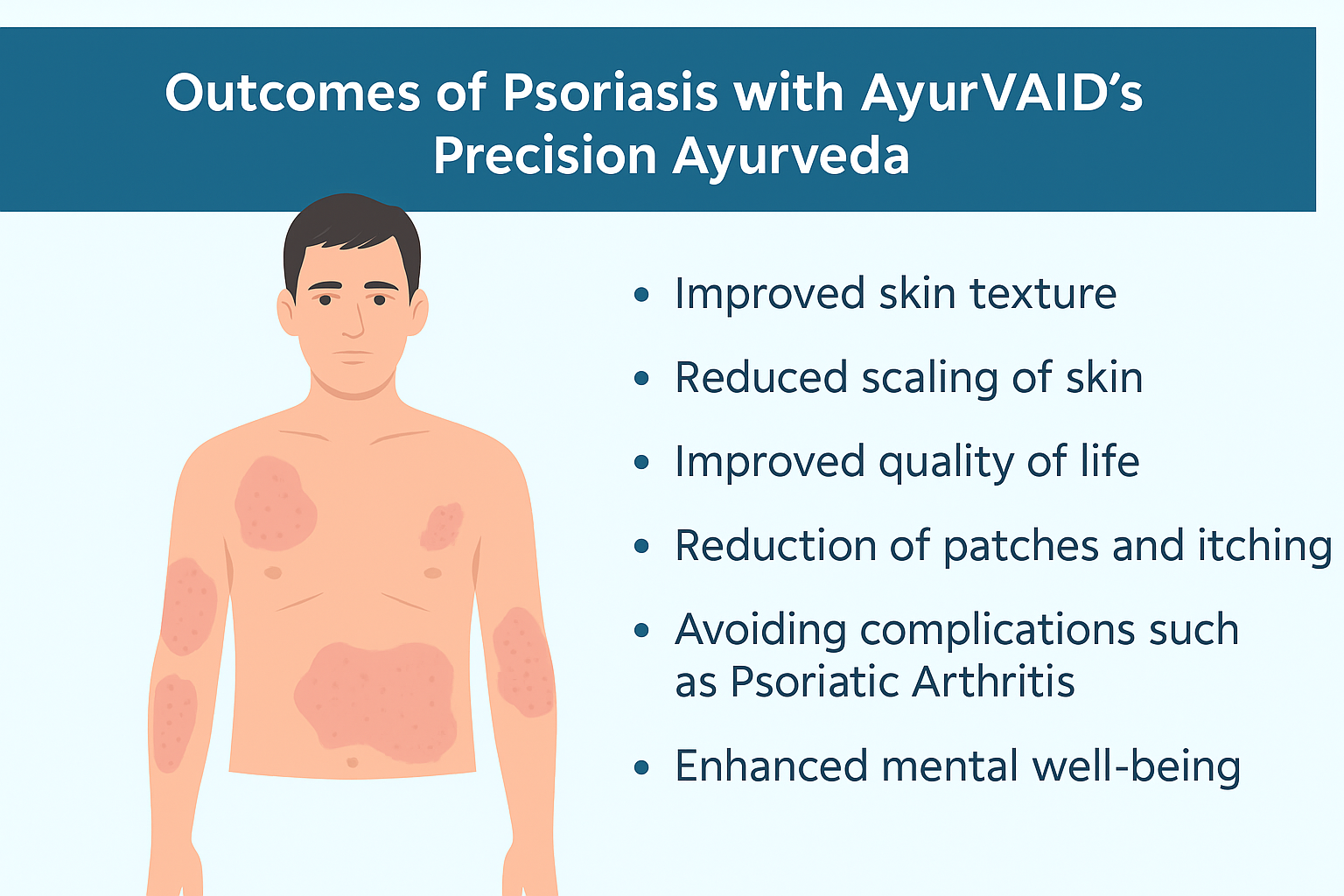
According to Ayurveda, psoriasis follows a complex pathogenesis characterized by dosha imbalance, dhatu vaigunya, and srotas dushti. The samprapti (pathogenesis) of psoriasis can be outlined as follows:
Nidana Sevana (Causative Factors/Possible Triggers): Imbalance of doshas and vitiation of dhatus is inherent for any disease. Consumption of incompatible, salty, sour, and fermented foods in excess, and Psychological stress with disturbances. Seasonal variations and faulty lifestyle habits trigger imbalances in the doshas, especially Pitta and Kapha.
Dosha Dushti (Tridosha Imbalance): Impairment of Vata, Pitta, and Kapha causes dhatu impairment.
Dhatu Vaigunya (Tissue Derangement): mainly affects these three dhatus: Rasa, Rakta, and Mamsa.
Agni Dushti & Ama Formation (Digestive Fire Impairment and Toxin Accumulation): With the disturbed metabolic path, digestion becomes compromised, and toxic material (ama) accumulates. Ama travels in the body and deposits into the skin layers.
Srotas Dushti (Disruption of Channels): Impairing the channels of Rasa-Dhatu, Rakta-Dhatu, and Mamsa-Dhatu. Due to this series of events, chronic inflammation develops, causing scaling and thickening of the skin.
Twak Adhishtana and Roopa Avastha (Symptom Manifestation at Skin Level): Scaly patches appear with redness and itching, with increased dryness over the skin.
Upadrava (Complication): The chronicity of the disease is marked by an increase in scales and fissuring with secondary infection.
Well-defined, raised red patches covered with silvery-white scales
Affected areas may cause moderate or severe itching, in some cases
Excessive dryness and cracking of the skin
Burning or stinging sensation on the lesions
Thickening and hardening of the skin in affected areas
Fish-scale-like appearance of the skin
Pinpoint bleeding after the removal of scales
Pitting, ridging, and thickening of the nails
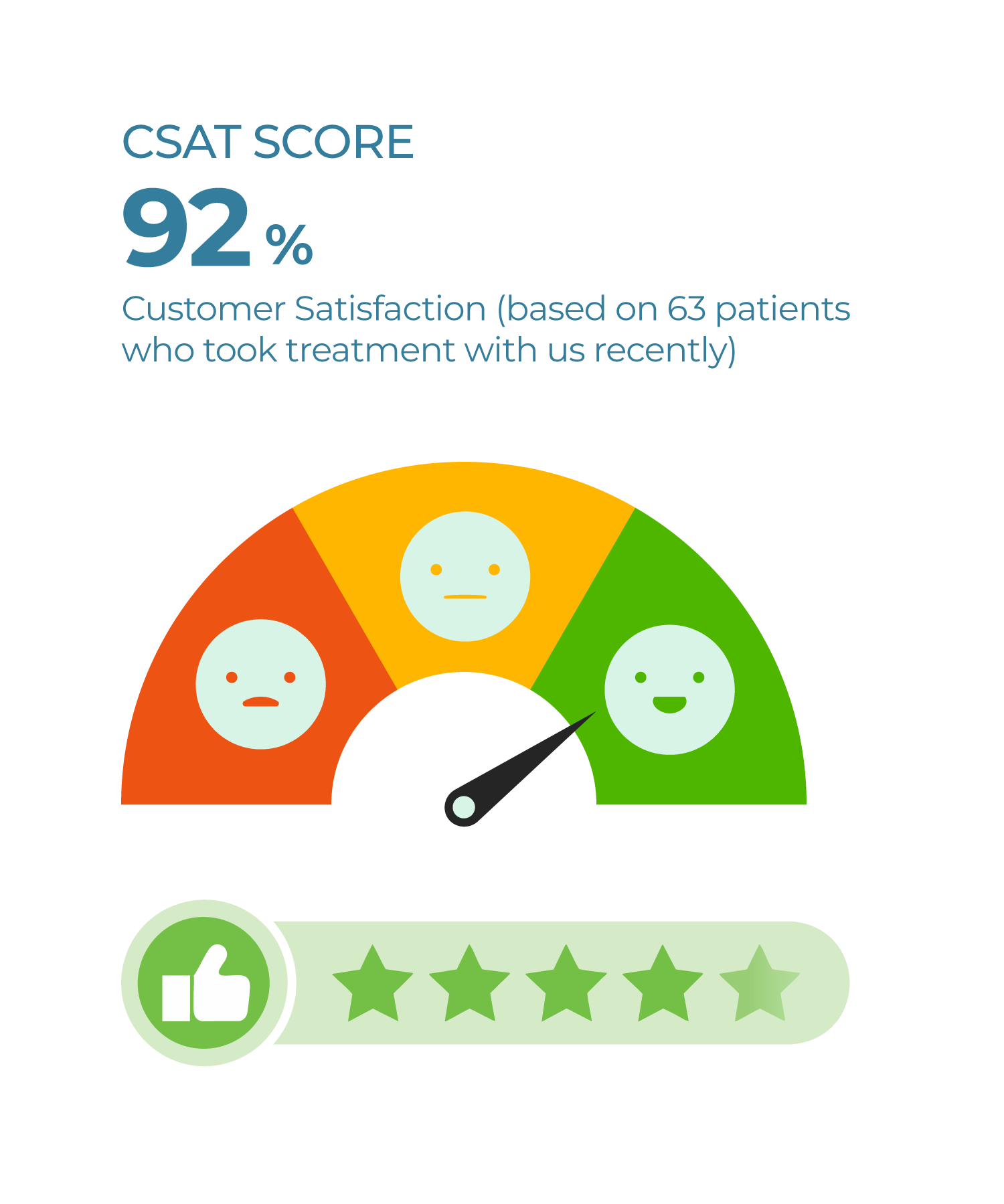
A detailed investigatory assessment is done on the presenting complaint, health history, and possible underlying causes – Nidana Panchaka and clinical routes of disease – according to Ashta Sthana Pariksha (8-fold examination), Dasha Vidha Pariksha (10 factors), and Srota Pariksha. Appropriate blood tests (CBC, ESR, CRP, liver function) and dermatological assessments (PASI Score, BSA) for complete evaluation are also done.
The entire disease tree, from the root cause to signs and symptoms, is drawn out from the causative factors, the imbalanced doshas, the subsystems involved, and the progression. This maps the unique pathway of the disease in each individual.
The personalized protocol-based end-to-end treatment plan for improving skin condition, decreasing inflammation, and reversing the pathogenesis of the disease is developed based on individual disease trees and corresponding assessments. The plan includes classical Ayurveda medicines, therapies, detoxification treatments, personal dietary recommendations, and lifestyle modifications. It keeps close track of all dermatological parameters and other health factors to ensure the healing of the skin and the accompanying inflammation.
The assessment of skin lesions, the progression of disease, and the quality of life implications is done by standardized scales such as the Psoriasis Area and Severity Index (PASI), Body Surface Area (BSA), and Dermatology Life Quality Index (DLQI).
With a discerning focus on symptom control to limit disease progression, alleviate discomfort, and augment life quality, Apollo AyurVAID has embarked on Precision Ayurveda, which is said to be protocol-driven. Psoriasis treatment in Ayurveda considers the patient holistically. It seeks to balance the doshas, eliminate toxins, restore skin functions, and build general vitality. In other words, the exact treatment and duration will depend on the different degrees of severity of the respective condition.
Poorvakarma Stage
Objectives: The Poorvakarma stage is primarily concerned with setting in motion a therapeutic process, treating the digestive strength, and initiating the detoxification process. Acute symptoms, such as itching and scaling, are handled, inflammation due to metabolic toxins (Ama) is reduced, and the digestive fire (Agni) is stimulated.
Duration: ~ 7-10 days
Therapies:
Internal Medicines: Medicines are prescribed based on the dosha disturbance to kindle the fire inside, improve digestion, and remove ama, which provides instant relief.
External Therapies: Lepa (applying herbal paste), Parisheka (pouring medicated decoctions), are used to decrease local inflammation, scaling, and itching.
Objectives: To thoroughly detoxify the body, get rid of toxins that have accumulated in the body channels and tissues, and balance the doshas.
Duration: ~ 14-21 days
For Pitta-Vata Predominant:
Virechana (purgation): This therapy helps expel excess Pitta and toxins from the liver and bloodstream. Snehapana (internal oleation) is first performed to loosen toxins.
Rakta Mokshana (blood purification): In cases of acute aggravation with excessive toxins in the blood, blood purification therapies are imposed to remove toxins.
Takra Dhara (pouring of medicated buttermilk ): Dhara soothes the nervous system, preventing further flare-ups by reducing the stress and calming the mind.
For Kapha-Vata Predominant:
Vamana (emesis): It eliminates excess Kapha.
Nasya (nasal instillation of medicines): Especially beneficial for scalp psoriasis or psoriasis with facial involvement.
External Therapies: Abhyanga (oil therapy), Kashaya Dhara (herbal decoction bath), and Lepana (application of medicated pastes) are done for both types of patients to enhance skin health and ease symptomatology.
Diet: An Appropriate diet will be prescribed by the physician.
Objectives: To enhance immunity, nourish the skin, and prevent recurrence.
Duration: ~ 3-6 months
Rasayana Therapy: Rejuvenative medicines and blood purifiers are prescribed to enhance immunity, improve skin health, and prevent recurrence.
External Applications: Application of medicated oils (taila) and other topical preparations provides continuous skin nourishment.
Lifestyle Changes: Dietary changes such as avoiding trigger foods, stress management through pranayama and yoga, light exercise, and following seasonal regimens (Ritucharya) to maintain skin health and prevent flare-ups are recommended. These measures can be taken at home (on an OP basis).
In more advanced or resistant psoriasis, the above approach is tailored more carefully for the maintenance, slowing disease progression, and more intensive interventions during flares.
NOTE: The duration of treatment is variable and may be prolonged or shortened based on disease severity, body surface affected, or comorbidity involved.
AyurVAID adopts a precise, protocol-driven approach to ensure effective treatment and sustainable recovery. The following baseline values are recorded:
Disease Standard Scales: International scales like PASI (Psoriasis Area and Severity Index), BSA (Body Surface Area), and DLQI (Dermatology Life Quality Index) are used to assess severity and impact on quality of life.
Biomarkers: To assess inflammation and the degree of change in the skin.
Patient-Reported Outcomes: To objectively monitor improvement of symptoms and quality of life while maintaining transparency and minimizing bias.
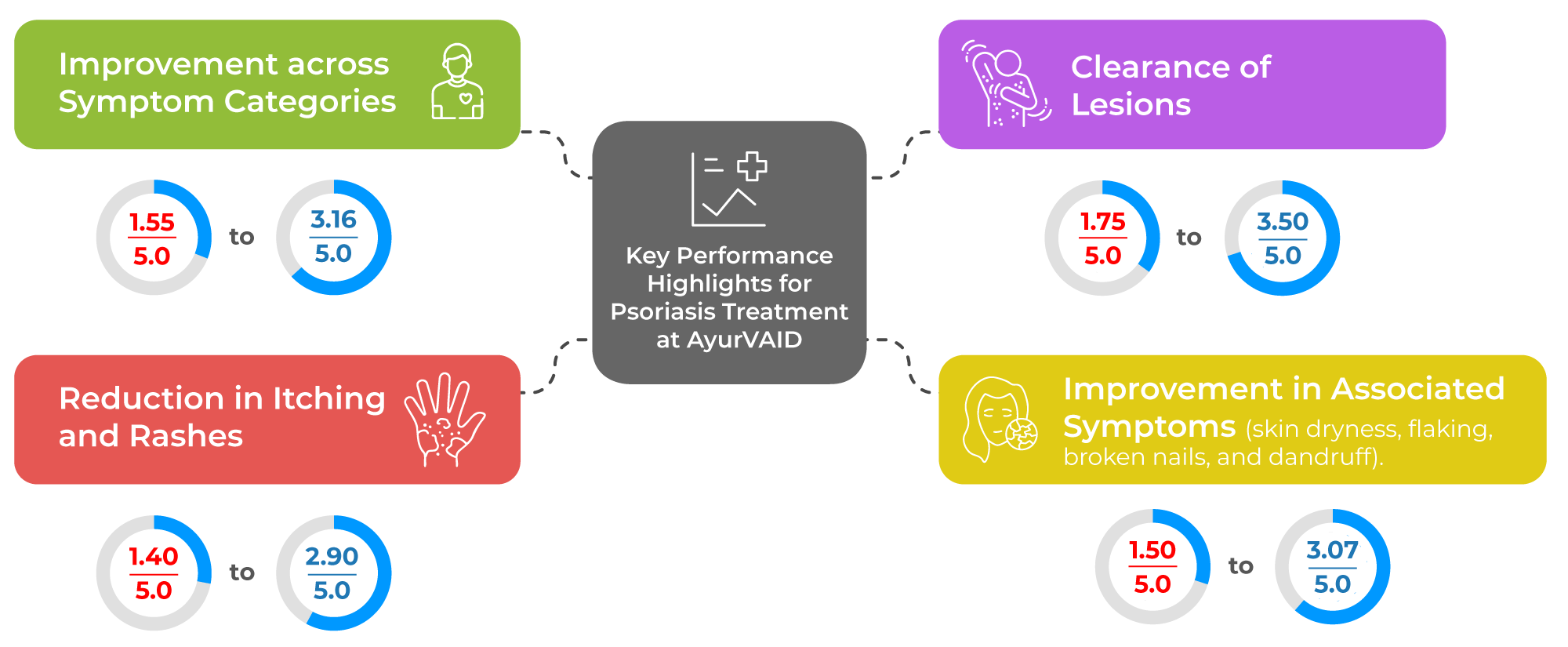
Case 1: A 30-year-old male patient complained of Psoriasis
Case Summary: The patient had been suffering from hyperpigmentation, erythema, itching, and scaling for six years, diagnosed as Psoriasis. The lesions were present on the scalp, face, genitals, buttocks, eyelids, palms, and soles. Previous treatments provided very limited effects.
He underwent a 28-day intensive treatment in Ayurveda, which included sarvanga takradhara, kashayadhara, snehapana, vamana, virechana, sarvanga abhyanga, nadi sweda, shashtika shali pinda sweda, kashayavasti, and taila/matra vasti, along with internal medications.
Post-treatment scores indicated a reduction in PASI score from 21.2 to 1.1 and improvement in Dermatology Life Quality Index from 16 (very large effect) to 7 (moderate effect). There was a significant resolution of lesions, with complete clearance on the scalp, face, arms, and legs, and marked improvement on elbows and knees. Overall well-being improved from 2/5 to 4/5 and vitality from 3/5 to 4/5, with reduced stress. At discharge, he was prescribed maintenance medications and advised on diet and lifestyle modifications for long-term management.
Case 2: A 36-year-old male with Palmar Psoriasis
Case Summary: The patient complained of dry, scaly skin rashes that have been itching on both his palms and soles for the past year, and they have worsened in the last six months. He also developed cut wounds on both palms and legs. Prior conservative treatments offered no relief, and the condition was impinging on his normal life.
He underwent a comprehensive Ayurveda treatment regimen at AyurVAID, such as Sarvanga Udwarthana, Sarvanga Bashpa Sweda, Snehapana, Takradhara, Sarvanga Abhyanga, Vamana and Virechana, along with internal medications.
Post-treatment, his PASI score came down from 5.4 to 0.6, representing a significant improvement in lesion severity. His thick, hyperkeratotic plaques on palms disappeared, and itching had decreased dramatically. His overall wellness improved from "fair" to "good," and his weight went down from 83 kg to 80 kg.
At the time of discharge, advice was given regarding maintenance medication, diet (to avoid fermented, processed, and dairy products), and lifestyle modifications. Follow-up was planned for continued improvement.
As we work hard to improve our services, your feedback is important to us. Please take a moment to help us serve you better.
The information provided in this blog is for general informational purposes only and is not intended as a substitute for professional medical advice, diagnosis, or treatment. Always seek the advice of your physician, Ayurvedic practitioner, or other qualified healthcare provider with any questions you may have regarding a medical condition or treatment.
Subscribe to our hospital newsletter for the latest health tips, updates on services, patient stories, and community events. Sign up today and stay informed!
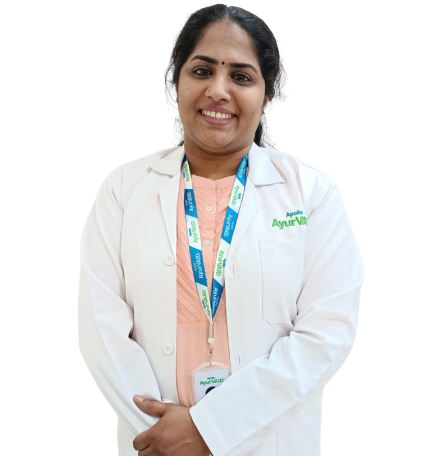



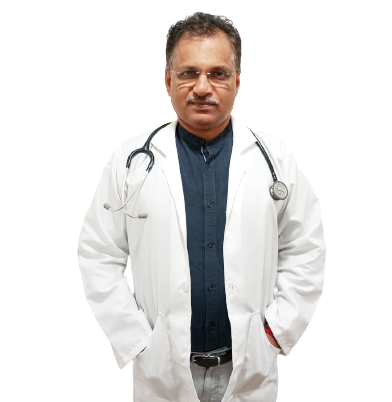
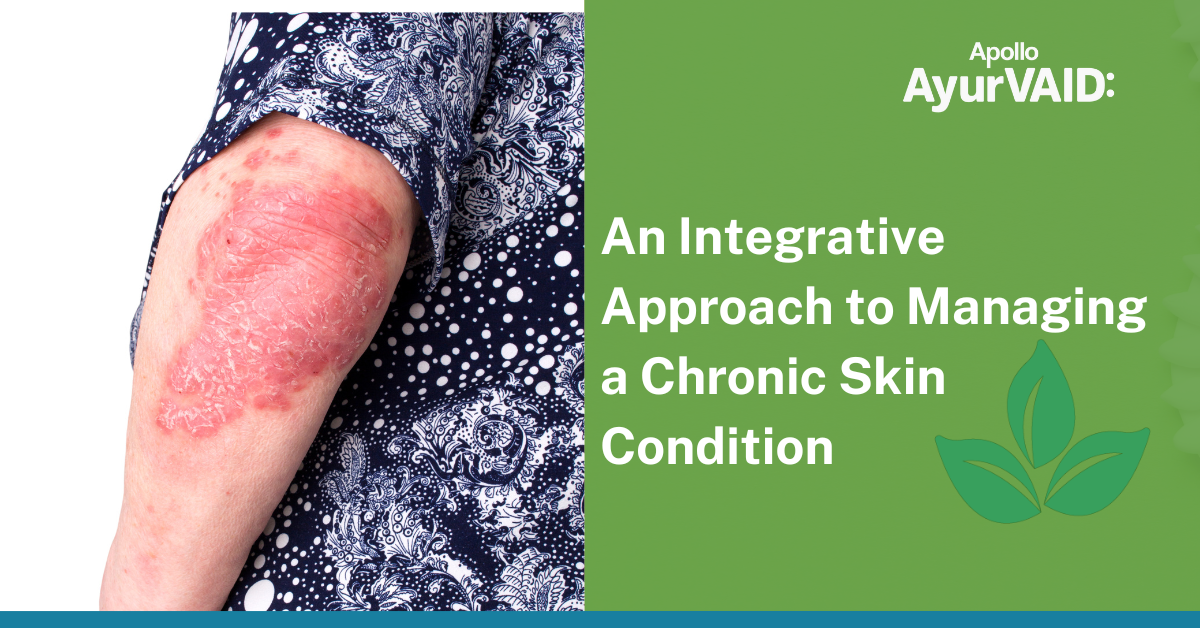
Bengaluru – Domlur Bengaluru – Aster CMI, Hebbal Bengaluru – HRBR Layout Bengaluru – Sri Shankara, Basavangudi Bengaluru – Bannerghatta Road Bengaluru – ArekereDelhi – New DelhiKochi – Kadavanthara Uttarakhand-Kalmatia, AlmoraChennai – Greams Road Chennai – Vanagaram Chennai – Kotturpuram Hyderabad – Somajiguda
Ayurveda Parasurgery Autoimmune Disorders Blood Disorders Cardiology Dermatology Endocrinology Ear-Nose Throat-Mouth Elder-Care Gastrointestinal Gynaecology Integrative Oncology Infectious-Diseases Liver-Hepato-Biliary-Care Mental Health and De-addiction Male-Reproductive-Disorders Nephrology Neurological-Disorders Orthopaedic Disorders Ophthalmology Obstetrics-Integrative Preventive-Health-Wellbeing Pulmonology Pediatric-Development-Disorder Sleep-Disorders
Any use of this site constitutes your agreement to the Terms and Conditions, Privacy Policy and Cancellation and Refund Policy
©2025 Apollo AyurVAID Hospitals. All rights reserved.
Popular Searches: DiseasesTreatmentsDoctorsHospitalsWhole person careRefer a patientInsurance